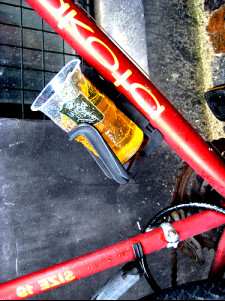Many articles found on big websites are promoting low doses of alcohol, including bike portals. We’re talking about drink after bike riding, not during the activity. Every day I meet with the statement of patients “ beer is not alcohol" during my medical practice. As usual, however, we will focus on a few numbers, to prove how drinking alcohol, beer included, impairs performance. Popular bicycling magazine tells :
"For several years, experts recommend all athletes drinking a half liter of beer before bedtime. Professor Manuel Garzon measured the impact of beer on the body of his students. After a workout at the gym, one group drank bottled water, the rest tried a beer with the same amount. It turned out that those who have received a alcohol after exercise, were much less dehydrated than those who drank bottled water. "(Bikeboard.pl)
As it turns out, Garzon never passed scientific review, to publish his work. It never appeared in pubmed. Moreover, there have been many scientific studies documenting the extreme opposite results. I’ve read one of them. It comes from the Journal of Applied Physiology, and measures how the body of trained cyclist behaves after taking small doses of alcohol. This is about 1 beer, creating blood concentration of 0.18 per mille of alcohol in the blood. It turns out that the power that the cyclist is able to maintain a after this drink is lower by 3.9% with compare to the control group. It impairs the performance greatly. We do know that this can’t affect a positive effects on the regeneration of the body also. Drinking beer causes a significant increase in diuresis. Generally one pees more than drinks of beer before. This results in dehydration. If during exercise even minor trauma occurred , alcohol is likely to slow its healing. This effect is closely linked to the increased production of urine (diuresis). It is responsible for vasodilatation in the kidney and also makes damage created by trauma larger.
Beer is also a poor source of carbohydrates, about three times worse than fruit juice. However, alcohol causes an increase in fat mass, mobilizing the esterification of fatty acids. Unfortunately, this involves another unfortunate consequence of drinking beer after exercise, namely the intensity of glycogenolysis, thus weakening the reconstruction of the substrate used during exercise, the glycogen. After each exercise the glycogen mass is reduced, if we facilitate the recreation of it, the very next day we will be stronger and have renewed resources to start exercise again. Unfortunately, alcohol consumption slows this process. Alcohol also shifts the balance of lactate - pyruvate in the direction of the first, increasing acidosis. It works highly catabolic, whether we want to build muscle mass or improve our fitness.
As a GP, I should discourage frequent drinking of alcohol (also a beer!) after exercise, even in small quantities. For rehydration use isotonic fluids, fruit juices, or even mineral water, when the exercise is not very long. Recommendations of beer is not consistent with medical knowledge.

No comments:
Post a Comment